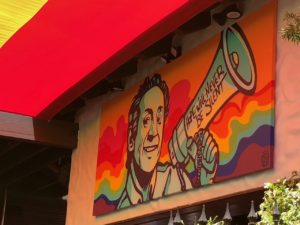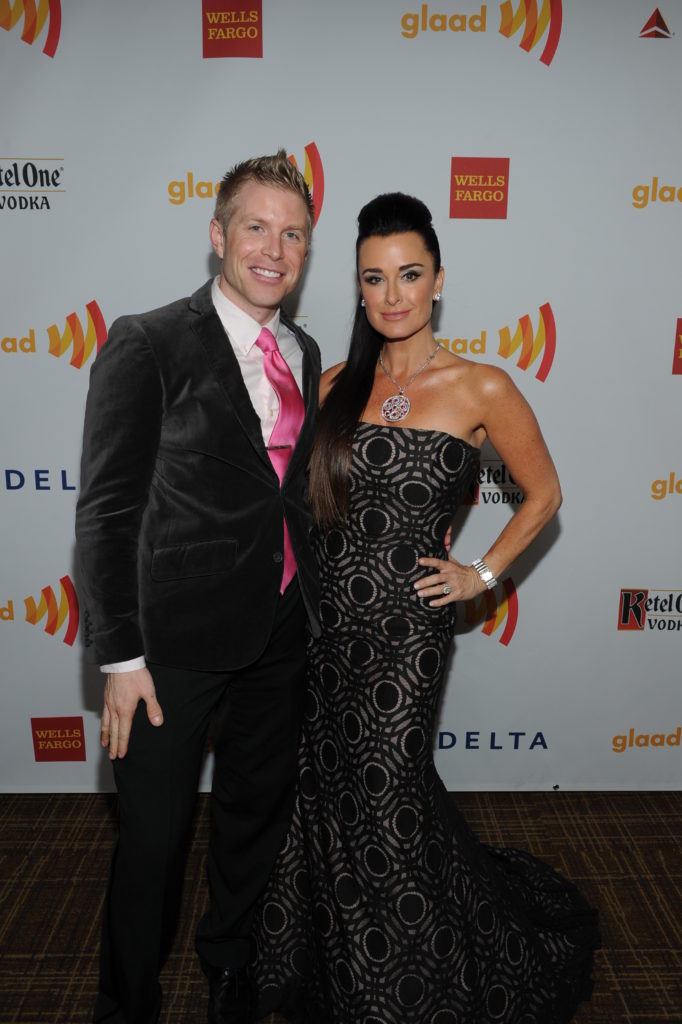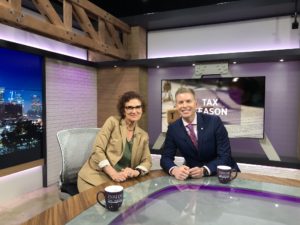
Did you know that one in four LGBT adults reported not having enough money to feed themselves in the past year? How does this sync with the image of an LGBT community that is dripping with wealth? And what do the privileged among us owe to those who are hurting? There is an LGBT Hunger crisis right here in America. Yet many of us believe the myth of gay affluence. Or at least forget it doesn’t extend to every member of the LGBT community.
By David Rae Certified Financial Planner™, Accredited Investment Fiduciary™
The myth of ultra-rich gay men and the six-packs who love them or the gorgeous L Word power lesbians stomping around West Hollywood, San Francisco and New York moving and shaking looms large, partly because some of these folks do exist and partly because their story is so darn mediagenic. We are even seeing putting a nice sheen on being broke in the new hit show POSE on FX.
Even if you are living the Instagram-worthy life of perfection, your rights may still be under attack during the second Trump presidency.
The Purchasing Power Of The LGBT Community Is Huge
The perception that the LGBT community is more affluent, more educated and higher achieving than the general public is a flattering one, and it’s high time, too. There are even reports showing, on average, gays and lesbians earn more money than the average straight Joes and Josephines. Many of us are doing extremely well.
Marketing statistics throw in their two cents to shore up the Gay = Rich equation as well. The Washington Post ran an article on the National Gay & Lesbian Chamber of Commerce (NGLCC) report that LGBT businesses contribute more than $1.7 trillion (that’s trillion with a T, people, as in a thousand billion) to the U.S. economy. That made me walk a little taller and feel a flush of you-go-guys-and-gals pride, I can tell you.
But as LGBT citizens, we are not one thing, financially or anything else. We comprise a diverse swath of races, creeds, colors, religions, socioeconomic realities and subcultures – hello Dykes on Bikes, Theater Queens, Bears, Otters, Hipsters, Gym Bunnies, Gay Dads, Heather Mommies and (gasp!) everyday working people who identify as queer – who cannot be painted with a single brush. At every level, we have all faced challenges standing up for our rights: for jobs, a place to live, and, more recently, the right to marry. Part of this picture is that too many of us are struggling to get by, find enough food to eat, and keep a roof over our heads.
To ensure you protect your finances during these tumultuous times, ensure you are working with a Gay financial planner or, at the very least, a progressive financial advisor.
Hunger and Woe in the LGBT Community – Myth of Gay Affluence
Buying into the stereotype that all gay people are rich (or, at the very least, upper-middle class) is about as accurate as saying that The Real Housewives of Beverly Hills represents all the straight married women in Southern California. In fact, the real economic truth about our LGBT community is a sobering one. And in this case, the truth hurts.
The Numbers?
A new report from the Williams Institute at UCLA stated that more than one in four LGBT adults could not afford to feed themselves or their families at least once in the past year. For comparison, only 1 in 6 heterosexual adults reported a similar issue with affording food. Given our current political climate, this tragedy is about to get much worse. Donald Trump won’t even officially acknowledge Pride Month.
But wait! How can this be? Not surprisingly, as a group, we face the same economic challenges as the general population does. However, some factors tend to hit our community quite a bit harder. Let’s deconstruct the situation step-by-step:
-
Making less means living on less
– In reality, many in our community are struggling and actually below average in terms of income (i.e., what they earn) and wealth (i.e., what they have.) In short, wealth equals security in multiple areas, from food to housing to health care. But those who are slaving away 80 hours a week at minimum wage and live paycheck to paycheck don’t have that security. For them, a single, unforeseen event can destabilize their whole precarious existence.
-
State rights can mean no rights for Lesbians, Gay, Bisexuals and Transgender Americans.
– I’m convinced that when a politician says he/she wants an issue to be decided by the states, it’s spineless weenie code for, “I’m actually a raging racist/sexist/homophobe/advocate of firearms in pre-schools but don’t want to go on record explicitly saying it.” But everyone knows the true intent of the message, however disingenuous. It’s no secret that the only states screaming for states’ rights are conservative, socially backward ones. In the case of LGBT rights on a state level, we lack employment protection against discrimination in 28 of them.* Plus, we don’t have protection from housing discrimination in much of the country either. Without these protections, it is very difficult to earn a living, let alone build wealth.
-
Family strife can mean a harder life.
– In our little urban bubbles, we forget that coming out to one’s family can spell violence, ostracism, and homelessness for so many. Statistically, LGBT youth are more likely to be homeless than straight kids**, regardless of whether they ran away or were kicked out. Combine homelessness, lack of education, and lack of opportunity, and three squares a day becomes an unattainable luxury.
- Fewer marriages can mean less financial stability for the LGBT Community– We can certainly attribute the lower total wealth accrued among LGBT folks to historically being denied the protections of legal marriage. There are myriad financial benefits to (a good) marriage, from security and stability. From increased disposable income to just making smarter financial decisions, it can be significant. At present, with Marriage Equality the law of the land, this wealth gap between gay and straight populations should eventually shrink. For now, though, the effects of millennia of marriage discrimination won’t disappear overnight.
-
HIV can mean a burden for too many
– The long-term cost of living with HIV is still a big concern for significant numbers. Thirty years ago, a positive diagnosis was a death sentence. Today, HIV is a chronic illness that can be managed. But even with great insurance, an HIV+ individual still needs to see a doctor more often, take more tests, and purchase more prescription drugs. All this translates into higher costs.
Luckily, with the ACA (i.e., Obamacare,) fewer people living with HIV find themselves trapped in terrible jobs just to keep their essential, attainable and potentially lifesaving health insurance policies. But with the latest presidential election and the cadre of ne’er-do-wells who rode in with it come much uncertainty on this front. Millions of people (if not hundreds of millions) will be affected by the evisceration of the ACA, forcing many to choose, once again, between the drugs they need to live and the food they need to live.
-
Transgendered can face the toughest road of all
– While I hesitate to enter into a ‘whose pain is worse’ pissing match, I can say with confidence that whatever gays and lesbians experience in terms of the above is a cakewalk compared to the discrimination and outright mistreatment transgender individuals face every day. Happy to see shows like Pose (from Ryan Murphy) shining some light on this part of the community.
Taking action against LGBT hunger
As far as wake-up calls go, this has been a gruesome fortnight for the LGBT community. Just when we thought it was safe to stroll up to the altar, a new administration rolled into town determined to sweep away those rights and any vestiges of residual, common sense humanity that went with them. So, none of us will be able to relax soon.
The question is this: if we are among those lucky enough to lead marvelously privileged gay lives–for whom hunger only signifies discomfort at the end of a six-day juice fast–do we owe it to our impoverished brothers and sisters to help? Short answer: Yes, we do, and yes, we must.
From the Aids Crisis to Today
What the AIDS crisis showed the world – and indeed we showed to ourselves – is that far from being a frivolous ragtag group who could be shamed into silence and submission. We could fight the power. The LGBT community got pissed, we got organized, and we went public. We got proud, and we got loud with our proclamation, “We take care of ourselves!”
And this, my friends, is what has to happen in this crisis, the LGBT hunger crisis, because nobody is going to do it for us, certainly not the government. Well, at least not for the next four years, anyway. Remember the good old days when Obama was President? Hunger is political and represents a far bigger issue than calorie consumption. Whether we organize, agitate, or donate, we as gay and lesbian citizens need to actively do something. Repeat after me: WE TAKE CARE OF OUR OWN! And for the foreseeable future, this means feeding our own.
As members of the LGBT community, we are well-represented in the highest and the lowest echelons of society. Our fight for equality and dignity didn’t end with Marriage Equality. Hell, our fight for Marriage Equality hasn’t ended with Marriage Equality either–I’m talking to you, State of Texas. There are ferocious battles raging, from bathrooms to job security to homophobia, too, yes,and hunger. Despite temporary setbacks, we will win this war. We know we’ve got the will, so let’s get going with the ways.
What to do to Support the LGBT Community
Take action, VOTE, VOLUNTEER, DONATE, MENTOR, MARCH, Live out and Proud. Do it during pride month. Do it year round. We are not second class citizens.
Some Charities I love:
SAGE – Supporting LGBT Seniors http://www.sageusa.org/
Los Angeles Gay & Lesbian Center (or your local LGBT Center if you are lucky enough to have one.)
GLAAD- Making Sure we are Portrayed Properly in the Media http://www.glaad.org/
Live for Today, but Plan for Tomorrow. Gay Money Matters.

As a queer financial advisor I help LGBT Allies, to create worry free wealth so they can live a happier healthier and wealthier retirement, save on taxes (do trump wont waste them) and spend fabulously with an income stream they can’t outlive.
DAVID RAE, CFP®, AIF® is a Los Angeles financial planner with DRM Wealth Management. A regular contributor to Advocate Magazine, Forbes.com, and Investopedia, not to mention numerous TV appearances. He helps friends of the LGBT Community across the USA get on track for their financial goals. For more information, visit his website at www.davidraefp.com
Enjoyed this article? Check out more Gay financial advice:










[…] our incomes, many successful fellows in the LGBT community can get away with an ever-increasing lifestyle of extravagant vacations, designer clothes, luxury cars, high-end gym memberships and many other trappings of wealth. Oh […]
[…] for the most part, it is. It is worth pointing out that there is a difference between income and wealth. Around three-fourths of the surtax revenue come from households earning more than $1 million per […]